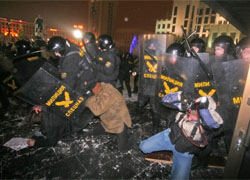Der Spiegel: German police trained belarusian riot police after December 19, 2010
36- 6.08.2012, 15:35

The last training was conducted from Feb. 21 to Feb. 25, 2011.
Accusations that German federal police had questionable ties to the despotic regime of Belarusian dictator Alexander Lukashenko were summarily dismissed by the head of the force last week. Now, new information has revealed that the rumors were actually true.
The suggestion was "complete nonsense," said Matthias Seeger, the chief of the federal police, who has since been relieved of his duties for reasons that are unclear. According to Seeger, the federal police merely had contacts with the Belarusian border patrol, and only until two years ago.
But in a response to an inquiry into police operations abroad by the far-left Left Party, which has been seen by SPIEGEL, the German government has revealed that Seeger's statements were false. As late as last year, the German federal police had not completely ended its training activities for the Lukashenko regime. It was still providing, at the very least, "instruction to Belarusian experts in the area of risk analysis," according to the German government.
The timing of the training, which was conducted from Feb. 21 to Feb. 25, 2011, is particularly noteworthy. It took place just days after the beginning of show trials in Minsk against opposition members who had protested against questionable presidential election results that further consolidated Lukashenko's power in December 2010.
During the protests, members of the country's OMON special police unit had beaten participants and arrested around 700 people, including almost all of the opposition presidential candidates. As a result, the European Union imposed drastic sanctions on Belarus in January 2011. Nevertheless, the German police had no trouble traveling to Minsk three weeks later.
Since his election in 1994 as the country's first president, Lukashenko has been a source of ongoing international concern, cracking down on free speech and other human rights. In March of this year, the EU widened its sanctions against Belarus, citing increased concerns about its "repressive policies."










